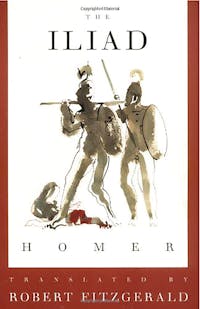The Iliad
The Fitzgerald Translation
 Download image
Download image
ISBN10: 0374529051
ISBN13: 9780374529055
Trade Paperback
640 Pages
$17.00
CA$23.00
Winner of the Harold Morton Landon Translation Award
Since it was first published, Robert Fitzgerald's prizewinning translation of Homer's battle epic has become a classic in its own right: a standard against which all other versions of The Iliad are compared. Fitzgerald's work is accessible, ironic, faithful, and written in a swift vernacular blank verse that brings Homer's saga to life.
In an introduction written especially for this edition, Andrew Ford, professor of classics at Princeton University and author of Homer: The Poetry of the Past, situates The Iliad both in the widespread ancient tradition of heroic songs and in relation to the specific concerns of archaic Greece, while also fully illuminating the strength of storytelling that is this poem's greatest enduring legacy. Fitzgerald's definitive translation of Homer's epic is timeless in its authority and always fresh in its vivid rendering of the preeminent war story of the Western world.
Reviews
Praise for The Iliad
"Mr. Fitzgerald has solved virtually every problem that has plagued translators of Homer. The narrative runs, the dialogue speaks, the military action is clear, and the repetitive epithets become useful text rather than exotic relics. Aside from the ability to write poetry, Mr. Fitzgerald's success derives from the use of a predominately Anglo-Saxon vocabulary, a concentration on specific meanings, and an occasional arbitrary, but highly effective, substitution of implication for literal sense. Odysseus becomes 'the great tactician,' which is not at all what Homer called him, but is almost certainly the modern equivalent of what Homer's audience understood."—The Atlantic Monthly
"[Robert Fitzgerald's Odyssey and Iliad] open up once more the unique greatness of Homer's art [and] the brilliant texture of Homeric verse."—The Yale Review
"What an age can read in Homer, what its translators can manage to say in his presence, is one gauge of its morale, one index to its system of exultations and reticences. The supple, the iridescent, the ironic, these modes are among our strengths, and among Fitzgerald's."—National Review
"This is a masterpiece and will surely rank as one of the best translations of a classic in the English language. It surpasses by far Richard Lattimore's, which has been heretofore the most popular modern version. Lattimore uses a cumbersome six-beat line which though euphonious is syntactically enslaved to the Greek. Fitzgerald's swift rhythms, bright images, and superb English make Homer live as never before . . . No quotations can do justice to the whole magnificent orchestration of poetic craft. This is for every reader in our time and possibly for all time."—Library Journal
Praise for the Unabridged Macmillan Audio Edition
"The Iliad and The Odyssey are informed by centuries of spoken transmission . . . Audio versions of The Iliad and The Odyssey, then, can fairly claim to offer the listener something more profound than merely an alternative method of absorbing a particular work. To listen to the poems is to partake of their most essential tradition. With these new recordings of Robert Fitzgerald's translations of both epics, published separately in 1961 and 1974, one of the critically anointed English translations now exists in spoken form. The lightness of Fitzgerald's touch, his almost conversational poetry, is well suited to the spoken word and to an audio version. His translation is in turn well served by the audio production. A flourish of epic music, Gladiator-style, introduces each recording—studied heroic fare to which this reviewer, at least, admits susceptibility. The reader is the talented actor Dan Stevens . . . his tone is not conventionally ‘bardic,' which is to say not dark, ponderous or declamatory, but rather young, bright and noble—as if King Harry had decided to deliver Homer instead of his St. Crispin's Day speech. The epics conjure a shimmering cast of some of the most memorable characters in all of literature. Stevens does a fine job of evoking each character distinctly, his approach is not histrionic . . . Steven's pleasant, even-keeled delivery . . . his level performance, his disinclination to permit any scene to hijack the steady narrative flow, ensures that his readings play like time-honored storytelling, cozy and accessible."—Caroline Alexander, The New York Times Book Review
"Not every book lends itself to the audiobook format, but there is an interesting subset of things that were actually meant to be read aloud. The Bible falls into this category, as does Beowulf, which Seamus Heaney both translated and read in a superb audiobook edition. But the paramount example of works composed not for the eye but for the ear are Homer's two great epics, The Iliad and The Odyssey . . . [Robert] Fitzgerald, who first translated The Odyssey in 1961, wrote as mellifluous an English as one could wish for: 'Sing in me, Muse, and through me tell the story/ of that man skilled in all ways of contending,/ the wanderer, harried for years on end,/ after he plundered the stronghold/ on the proud height of Troy.' Fitzgerald's smooth, musical verse is perfectly matched in this performance by the light, honeyed tones of Dan Stevens, the British actor who played Matthew Crawley in the first three seasons of Downton Abbey. Stevens has beautiful, clear articulation, and wonderful pacing, and he really seems to enjoy the poetry of the words. I confess that I could listen to him all day, which is good because the running time for this unabridged edition of The Odyssey is 10 1/2 hours, with another 14 hours for The Iliad, which he also reads."—Christina Thompson, The Boston Globe


